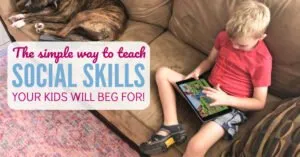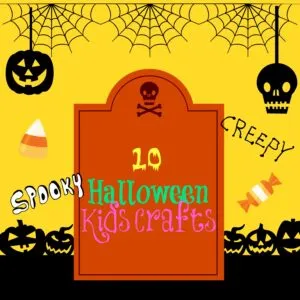Podcast Episode 34: One Simple Skill Your Kids Should Master to Deal with Mean Kids
Mean kids. They’re everywhere.
You hear about the kids at school who find one little thing different about your child and then dive straight in for the kill.
Maybe it’s enthusiastic dancing during the GoNoodle video during class.
Or maybe your child pronounces a word slightly differently. The mean kids ask your child to repeat the word over and over again while they snicker.
Let’s face it. These kids who tease are not horrible human beings (although our mama bear senses want to say they are).
No. They just lack social skills.

It’s true. And if we want our kids to avoid these mean kids and seek out positive relationships, we as parents, need to teach them the social skills to:
- Be kind to others and
- Recognize when other people aren’t using positive social skills.
By teaching these, kids will be better able to point out the mean kids and explain why they’re mean because they’re not using a specific skill.
Social skills can be taught
In her book, Happy Campers, Audrey Monke, a seasoned camp director lays out the nine summer camp secrets for raising kids who become thriving adults.
The ninth secret: Coach kids to better friendships
Monke says, “One of the most important social skills our kids need is the ability to discern who might be a good friend. Kids need to find other kids who accept who they are, consider them an equal and share their same interests.”
By teaching our kids the basic social skills to make and keep friends, we help them figure out who’s a good friend and who might not be a good fit.
Let’s start simple though.
Does your child know how to include others?
If not, that’s normal. Completely normal.
One simple skill: Including others
When I first had my daughter, I felt so lonely.
My friends weren’t calling to invite me over. I was on three-month maternity leave from a job I loved.
So I spent my days at home. Cursing the drama that’s breastfeeding and having no one but a newborn to talk to.
I cried more times than not as I looked at my daughter and steeled myself with, “It’s ok. Only 18 more years of this and I can have my life back.”
I got myself into counseling right there. During one of my weekly appointments, I mentioned how lonely I felt and how no one wanted to spend any time with me.
My counselor looked me in the eyes and said, “If you want to see people, you need to make the first step.”
This is true with kids, too. In fact, I think a lot of us think this way.
Monke explains in Happy Campers, “Many kids falsely believe that the fault for lack of friendships lies with other kids. They think that because people aren’t coming over to talk to them, inviting them to play, or including them in games, the other kids don’t like them. What they don’t see is that they need to take action to make friends.”
We all need to take action.
One simple way to do this is to teach your kids how to invite someone to play. And I’m not talking about a playdate. I’m referring to seeing someone sitting alone at the playground and inviting them into their game.
Start with a question
You can do this first by asking your child:
“Do you ever see anyone alone at the playground?” or “Is there anyone in your Zoom classroom who’s pretty quiet and you would like to get to know more?
At first, they may say no.
But, you’ve started the conversation. You’ve made them aware. And you’re not going to stop there, mama.
Show them how
When we think of teaching our kids these skills, we think of those Full House sitcom moments. Danny Tanner, Jesse, and Joey sit down and have a heart-to-heart with DJ and emotional music swells in the background.
That’s not real parenting.
The best way to get through to our kids is to show by example. It’s what teachers call modeling.
We model the behavior we want to see.
But so often, we forget this is the most powerful way to get through to our kids.
Talk through your friendship problems.
Tell them how you reached out to your friends via text to check in on them because you haven’t heard from them in a while.
Or bringing cookies to a neighbor down the street who you don’t know very well.
Our kids copy what we do.
Teach them friendship bids
How exactly do you approach someone you don’t know but you want to know better?
This doesn’t come naturally – not for us as adults or for kids.
Monke suggests teaching kids how to make a small invitation which she calls a “friendship bid”.
This can be something simple, like:
Do you want to join our Minecraft game?
Want to sit next to each other at lunch?
Want to be my partner for this?
How do you teach this? You can role-play.
Perhaps after talking about including others, your child will start telling you about a situation where he or she saw someone alone and they invited them over.
(At which point, you just scored a parenting win and will probably want to stop jumping up and down… but you hold back).
You can continue the conversation by asking, “are you going to ask them again?”
Based on how that goes, point out little things they can invite that person to do. Those little things are friendship bids.
Teach to avoid mean kids by mastering kind skills
The best way to deal with mean kids is not to come up with strategies for avoiding them.
It’s not.
Rather, it’s to be proactive in being a kind person.
Teaching your child to include others will help them be kind and help them notice when others are not practicing this skill.
Resources We Shared:
Make Homework Fun Challenge Pack
Helping Kids Build Better Friendships with Audrey Monke
5 Reasons Your Last Family Meeting Failed
The best mom is a happy mom. To better take care of you, download our No Guilt Mom mindset here . These reminders will help you second guess less, and feel more confidence every day in your parenting.



















